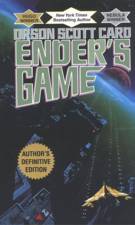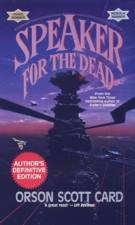

| Click on a book's image or title to order from Amazon.com |

Ender's Game
Tor, PB, © 1984, 324 pp, ISBN #0-812-55070-6;Reviewed September 2002
Ender's Game is probably among the most acclaimed science fiction novels in history, having won both the Hugo and Nebula awards and vaulted Orson Scott Card into a lengthy and popular career. But is all the hype justified? I'll probably never know what I would have thought of this book had I read it when it came out, since I've known the "punch line" for years. Still:
Andrew "Ender" Wiggin, age 6, is the third child of a couple on an Earth which has fought two wars against the alien and insectoid "Buggers", and repelled them the second time only through the heroics of one man. Ender, his brother Peter, and his sister Valentine, are among the smartest children produced by humanity, but Peter is a psychopath, and Valentine a pacifist. The military wants Ender to be somewhere in between: Stable enough to grow to command the Earth's defense forces, but willing and able to fight and defeat the Buggers.
Ender ships out to Battle School, where children are trained to become warriors. Ender shoots through the ranks, but is carefully kept separate from the other children, apart and in many ways superior to them thanks to his strategic and leadership skills. Along the way he gathers several compatriots (it's not quite right to call them "friends") to his side: the clever Shen, the smart sharpshooter Petra, and the brilliant prodigy Bean. Meanwhile, on Earth, Peter and Valentine have been making names for themselves - false ones - as two of the foremost thinkers about what the Earth should do after the war with the Buggers.
Ender and his battle squad are pushed into tougher and tougher situations against more and better opponents in the battle room, until they're on the point of exhaustion. Ender feels that he can never be seen to fail, even once, or all his accomplishments will fall down like a house of cards. Then he's graduated - several years early, at the age of 11 - and sent to Command School, where the real fun begins.
As I said, Ender's Game ends with a surprise twist, but any good book should have a lot going for it besides the twist, and Ender's Game falls short.
First, all of the characters save for Ender are completely one-dimensional. None of them show any character development at all, or have any range or notable features beyond their single basic trait ("brilliant", "clever", "sharpshooter", "manipulative", "resentful", etc.). The book belongs wholly to Ender, and even he is a disappointment: He's constantly torn between trying to live up to his hopes of solving problems rationally rather than through violence, but he never has a true chance to make the choice; he's always railroaded into behaving in a certain way. And then after the story is (basically) over, he only perfunctorily processes his behavior. Instead, he seems to run away from all his problems and we're given only a general overview of how he proceeds from there. As a story of character development, Ender's Game is a complete failure.
The story has plenty of implausible bits, too. For instance, Ender and his companions never feel like children. Sure, they're brilliant, but they exhibit no behavior which makes them seem childlike. It's also hard to believe that the military would let Peter and Valentine run amok as they do. Their story is essentially superfluous, anyway; it could have been cut entirely from the book and made the book shorter and more streamlined. They serve no useful role.
And the writing style feels like it comes right out of the 1950s: Unadorned prose, lack of characterization, straightforward plotting. It feels bizarrely out-of-place alongside near-contemporaries like Neuromancer and Marooned in Realtime.
The book's redeeming feature is Ender's ongoing education in battle and strategy. He has a series of puzzles to figure out - puzzles in a virtual reality world, and against other teams of students - and how he works through the ramifications of the scenarios. It's entertaining to read, but not enough to carry the book.
Ultimately, there's barely enough here besides the surprise ending to make Ender's Game worth reading. The original novelette version might be more rewarding (in that it's shorter), but the novel is not essential reading unless you want to read all the Hugo and Nebula winners.

Speaker for the Dead
Tor, PB, © 1986, 382 pp, ISBN #0-812-55075-7;
Reviewed September 2002
Following the events of Ender's Game, Ender Wiggin becomes the first Speaker for the Dead, writing a pair of books for humanity to understand both the extinct Buggers and itself. He then travels with his sister Valentine through the stars to speak the deaths of humans on all worlds. Thanks to relativistic effects, the pair survive 3,000 years of objective time, but are only in their mid-30s themselves.
In the meantime, humanity has discovered another sentient species: The "Piggies", on the planet Lusitania, colonized by a group of Catholic Portuguese. Having long since come to revile the legendary Ender, mankind is afraid of exterminating another species, and almost entirely quarantines the colony behind a wall, allowing only the barest contact with the Piggies. Worse, a disease called the Descolada ravages the colony until two scientists find a cure. Both die in the process, and their daughter, Novinha, becomes cold and ostracized. Things come to a head when she becomes a pupil of the Xenologer Pipo, and falls in love with his son, Libo. Pipo is killed by the Piggies for reasons unknown, and Novinha sends for a Speaker for the Dead to speak his life. Ender, only twenty years away, hears her call and feels compelled to investigate this sentient life form. He and Valentine finally go their separate ways.
Ender arrives on Lusitania to find his coming not welcomed, and that Novinha now has a large family which is both socially sick, and central to the problems that face the human community and its relationship with the Piggies. Ender's role as Speaker is to speak the truth about what has happened, and about those people whose deaths he was invited to speak, and he has to thread the needle to understand what has happened and why, in the face of being ostracized by the colony.
Speaker for the Dead is a radically different book from Ender's Game. The earlier book was a straightforward and even simplistic book, while Speaker is wrapped up in strong human emotions, complex motivations, and the mysterious nature of the Piggies. It is, overall, a much more sophisticated and mature book. In retrospect, it's unfortunate that Card had to write Ender's Game as a novel, rather than opening Speaker with the "Ender's Game" novella, much as Richard Cowper opened his excellent novel The Road to Corlay.
As a novel which stands on its own, though, there's a lot to like about Speaker: It's an emotionally charged story whose characters' motivations don't feel contrived, and where nearly everyone has a secret agenda which it is Ender's job to bring to light. Ender does have a few, perhaps, unfair advantages, but his teasing out of the characters' stories and motivations is the book's greatest strength, and Novinha and her children and genuinely interesting and sympathetic characters, in large part because of their flaws.
The science fictional aspect of the story is not quite as successful. The Piggies' secrets are broadcast well ahead of time, although the details of some of their stranger acts are better concealed. I was never entirely convinced of their motivation for killing Pipo, though. And I could never shake the feeling that the Piggies were just an updated version of H. Beam Piper's Fuzzies; the approach the humans take to understand the Piggies and learn to work with them is essentially the same as that taken in Piper's Fuzzy novels. In all, rather than reaching a moment where I thought, "Aha!", I instead reached a point where I thought, "Aaahhh, I see where all this is going." So the story's climax had less of an impact on me.
Speaker does do a much better job than Ender's Game at tackling the former's central conceit, though: How humanity as a species reacts (or might react) to an alien species it doesn't understand, regardless of whether it presents a clear threat. The question of whether mankind's attitude towards the Piggies is genuine is central to the story and presents an interesting conundrum. Unfortunately, the conundrum isn't entirely resolved by the end of the novel; I suspect it's continued in the next book in the series.
In the end, Speaker for the Dead is a good book because of its handling of its characters, not because of its science fictional issues. I didn't find it an unusually well-written book, though, or that it really broke new ground in science fiction, so as with Ender's Game I'm a bit baffled as to why it won both major SF awards, especially considering it was up against Vernor Vinge's outstanding novel Marooned in Realtime. It's worth checking out (and you don't really need to read Ender's Game to understand it), but I'm not really motivated to continue reading through the series.
hits since 17 September 2002.